Tidbits - October 27, 2016 - Reader Comments: Two Weeks to Go - Dump Trump, Defeat Racism and Misogyny...Then Fight Like Hell; Remembering Tom Hayden; Syria; Bob Dylan; and more ...
- Re: Dump Trump, Defeat Racism and Misogyny, Build the Left (Lois Racz)
- Re: Learning to Claim Our Victories - Finding Hope in Dismal Times (William Minter)
- Re: Bernie Sanders Taps His Donor Network to Raise Nearly $2 Million in Two Days for House, Senate Contenders (Laurel MacDowell; Daniel Millstone)
- Re: Third Parties - Friday Nite Video - Oct. 21 (Leonard J. Lehrman; Griffin MB)
- Remembering Tom Hayden (Carl Davidson; Ricardo Alarcón de Quesada)
- Re: When Librarians Are Silenced (Susan Harrison; Joseph Kaye; Carole Kennerly; Ellen Broms)
- Re: Against the No-Fly Zone (Scott Kimmich; Carl Foster; Jean Cushman; Diane Laison)
- Re: Remembering DuBois' "Behold the Land" Speech (Chuck Weed; Earl Marty Price: Joan Kresich)
- Re: Election Views: Support Hillary, Then Fight Like Hell (Judy Atkins; Michael Arney; Mike Munk; Igor Goldkind; Dave Brown; Ray Markey)
- America - take a deep breath! You only have less than three weeks before this Presidential Election from Hell is history (Bill Hughes)
- Video - Palestinians thank the Women's Boat to Gaza (Gail Miller)
- Re: The Nobel Committee Got It Wrong: Ngugi wa Thiong'o Is the Writer the World Needs Now (John Woodford)
- Re: Chimes of Freedom: The Politics of Bob Dylan's Art (Larry Aaronson; Jack Radey)
Announcements:
- Crisis in Public Higher Education - New York - November 4
- You Say You Want a Revolution - American Artists and the Communist Party - New York Exhibit - October 18, 2016 - February 11, 2017
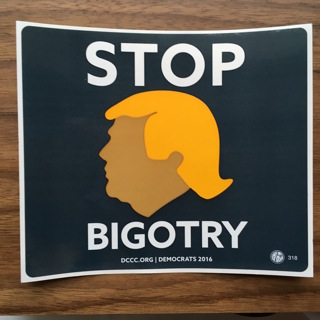
To the signers of your long political letter, a Bit more anti-Trump than anti-Clinton and mercifully not suggesting the 2 spoiler candidates running between 2 and 7%, depending upon the state:
Once a registered Independent in Ma., now no choice but to have to choose a party in NY, I have however mostly voted Democratic over the years. I did Not vote for either Bill (1992) or Hillary (2008, 2016) Clinton in a primary vote but rather for their Democratic challengers, though I have been grateful to vote or plan to vote for a Clinton over their Republican opponents in the general election.
I found your letter to be quite unpleasant, although I am aware of the negatives laid at the Clintons' feet over time, some deserved, some decidedly wrongly accused. I expect Portside to have chosen mainly the 'provable' ones, but in light of the realities of this difficult election I regret that Portside indulged in such a distasteful 'endorsement' of your obvious lesser-of-two-evils selection. There's been a lot of good in Hillary's positions and actions over these decades, and you might have mentioned some without almost choking over your choice. I am more disappointed in this article from Portside than I can express.
Lois Racz
"For many years I've noticed that my corner of the political world, roughly the American left, has had a very hard time recognizing and claiming our victories. Maybe that's because it's cost us so much to understand all the ways in which the standard American narrative is a lie, to grasp how little the American Way -- whatever Superman may have believed -- has had to do with truth and justice." - Rebecca Gordon
William Minter
People are still supporting the work of Bernie Sanders because he is an honest man. It would be wonderful if his efforts led to a Democratic majority in the Senate. If Bernie was made head of the budget committee, so much the better. It would partially make up for the stressful election campaign and would allow him to keep the heat on Hillary re trade deals etc. The stress continues with Trump's notoriously undemocratic posturing.
Laurel MacDowell
====
$2 million ain't hay but it doesn't make a revolution in and of itself. It's a good thing that Our Revolution can reach out and raise money but, imo, it needs to move bodies as well. Here, via Portside, John Wagner reports on some emails sent out and money back. How though can hands and hearts and minds be mobilized and not just credit cards?
Daniel Millstone
Posted on Portside's Facebook page
I admire both John Oliver and Jill Stein very much, and am glad he has written on her, but while his skewering of the other candidates has been right on, I think he has given her short shrift, implying that she does not understand all that she's saying. when in fact she does, very well.
Leonard J. Lehrman
====
that Oliver video is relentlessly opportunistic, not to mention misogynistic (i don't agree with the Greens' strategy/electoral fixation but Oliver the male non-scientist has no business mansplaining science to a Harvard MD, sorry). plus Oliver himself clearly misunderstands how the Fed works, despite his snark about Stein's own misunderstanding. you should seriously re-think it - i'm afraid i'll have to unfollow as a result
Griffin MB
Posted on Portside's Facebook page
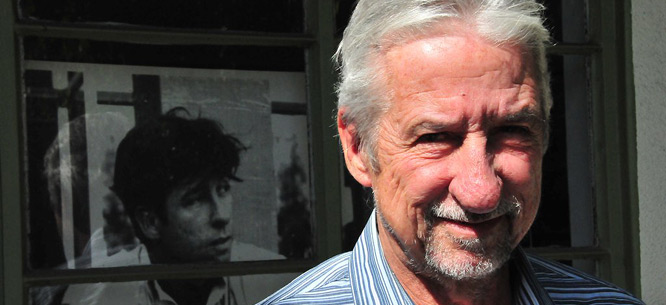
Tom Hayden, 2009
photo credit: KCET Departures / Flickr // Dissent
I got the news as soon as I awoke today. Even though I knew he was seriously ill, it still came as a shock. It seemed too soon, still too much to do, and too many things I would still like to hear him speak and write about, but now would be unspoken and unwritten. Tom was a comrade in our same organization, Students for a Democratic Society, and in the same battles for peace and justice before I got to know him well enough to be among those he called his friends.
My first indirect contact with him was through typewritten mimeographed pages stapled together in an SDS pamphlet that sold for ten cents. These were his writings as a student journalist and activist from the front lines of the freedom struggle in Mississippi and Georgia. In addition to his accounts of vivid battles in well-written prose, we also got other deeper messages about commitment and physical courage. It was not enough for us just to hold good opinions about social and political matters. We had to be engaged, body and soul, willing to be, as Tom was, on the receiving end of a billy club in Mississippi or the insides of a Georgia jail. He inspired me and many others to go to these battlegrounds ourselves and `put our bodies on the line.'
Soon Tom had also written, together with Carl Wittman, another mimeographed SDS pamphlet I read, entitled `An Inter-racial Movement of the Poor'. It was about the need to get beyond the campuses and organize among those most in need, into community-based organizations in the inner cities. Again indirectly, he inspired me to visit an SDS community organizing project in Cleveland on my way back to the University of Nebraska via hitch-hiking. What I learned inspired our SDS chapter in Lincoln not only to get our own mimeo machine, but to rent an `SDS House' in the midst of Lincoln's small Black and Native American neighborhood, called `T-Town' after 22nd and T street. Hanging out on our porch there with our neighbors one afternoon, we got the news that James Meredith had been shot attempting a `March against Fear' through Mississippi. Within hours, we had two carloads, students and community folks, off to Memphis to continue the March. Those experiences were powerful and changed my life. A few months later I found myself elected to the SDS national office in Chicago.
At the national office, I learned more about Hayden, this time in regular print. We distributed, of course, the nicely printed Port Huron Statement. One day I was thumbing through it, and commented to Greg Calvert, "This is really well done, especially the beginning, even if the last half is a bit reformist for today." Greg laughed, `that's Hayden's writing. The beginning is all his, and that's what turns everyone on."
My job at the NO was to focus on `internal education' and it meant visiting chapters, and over two years, I must have visited 150 of them. This brings me to my next way of knowing Tom, through black-and-white celluloid film. We had very little money, so to travel, I took literature to sell and films to show along the way, at each stop making enough to get to the next. One of the films, about 30 minutes long, was called `Troublemakers.' It was about our community project in Newark, and featured Tom, among others. We got to see him at work, bringing people together, asking lots of questions, drawing people out to feel comfortable with their own ideas, and their own potential for political power. Tom was always laid back, non-domineering, but still serving as a catalyst, working toward united action. It was a good model for us who aspired to be organizers.
My next knowledge of Tom was through the newspapers. He had raised a ruckus by joining Herbert Aptheker of the Communist Party and Staughton Lynd, a pacifist Yale history professor, in going `behind enemy lines' to North Vietnam, to make a direct contact between the US peace movement and `the other side' in Hanoi. Most of us SDSers had years before decided that justice was on the side of the Vietnamese, so we were quite pleased with the trip, even as the news pundits were scandalized. We felt Tom had hit one out of the park with this move. In fact, it changed his life, since on his return he shifted away from local organizing among the poor to the larger and more intense struggles that were developing around the escalating Vietnam war.
By 1968 I finally got together with Tom directly. We met, in of all places, at the famous round bar at the top of the Havana Libre Hotel, formerly the Hilton, made famous in pre-revolution days with the likes of George Raft, Humphrey Bogart and others of their pack hanging out there. We were both delegates to the international Cultural Congress of Havana, and others at the bar those nights that I met were Andre Gorz from France and Robin Blackburn of New Left Review in the UK.
Then one night that week Tom and I got a summons. Together with antiwar leader Dave Dellinger, we were to be whisked off to a private meeting with Fidel Castro. We entered a car with several soldiers and were treated to a topsy turvy high-speed route around the city, finally ending up at an ordinary suburban house, but with soldiers with machine guns in the shadows. `Sorry for the security measures,' one of the soldiers told us, `but due to your CIA, we still have to practice the clandestine ways.' Inside were Fidel, and two of his top people, `Red Beard' and `The Doctor', an official who had trained at Harvard. They said little, but helped Fidel with translation, even though Fidel understood English rather well. We discussed everything under the Sun for a few hours, with Tom and Dave giving Fidel a full account on the antiwar struggle. We asked about the fate of Che Guevara and Regis DeBray, and Fidel wanted more of our opinions of various political figures in Congress.
After those intense days, I wasn't in direct contact with Tom for some time. He had continued his antiwar work through the battles in Chicago's Grant Park in 1968 and the ensuing trial, then with wife Jane Fonda, their tireless efforts in the Indochina Peace campaign and the GI coffee house movement. Finally he entered electoral politics, eventually becoming a State Senator in California. I went a different direction, through years at the Guardian then into the 1970s `party-building' movement and several trips to China, finally settling in Chicago, working in the election campaigns of Harold Washington and Jesse Jackson, among other projects, especially antiwar work.
As the war in Iraq unfolded and our movement was growing around the state, we decided on a statewide meeting in Champaign Urbana. I offered to get Tom to be the keynote speaker-he had just written a book on Iraq-and he agreed, and did an excellent job. In that speech, Tom made a deep lesson click in my mind. Wars end in three ways: when the streets become ungovernable, when the soldiers refuse to fight, and when a Congressional majority refuses to pay for it. Pick all three, any two or any one of them. But get to work. It's not crowded up front.
Members of the Campus Greens were at that conference, and I had given them some space in my office for their national work on the Nader campaign. A few months later, they invited both Tom and I to speak at their national convention at the university in Lawrence, Kansas. My talk was in a small group workshop, but with about 50 people, with Tom listening in. It went well, with Tom later telling me `You have a great way with stories.' Tom spoke to a full auditorium the next day. I sat in the back, taking it all in. He was in great form. Both prose and poetry rolled off his tongue for over an hour, covering everything, and his audience was both spellbound and inspired. It was vintage Hayden, even through the long Q and A session.
During my electoral and antiwar work in Chicago, we helped a young guy named Barack Obama to get elected to the statehouse, then got him to speak at our antiwar rallies, and elected to the US Senate. After a major successful antiwar rally in 2007, I decided to move back to the Pittsburgh area where I grew up, and continue to organize there. Hayden knew about our antiwar work with Obama, and one day he called me up, inviting me to be webmaster for an independent media project, loosely connected to the Progressive Democrats of America, called `Progressives for Obama.' By this time, I had moved from backing Kucinich to backing Obama, so I readily agreed.
The next year was some of my most intense work with Tom, with weekly, even daily, phone calls, and two trips to Los Angeles. The web site project was both controversial on the left and quite successful. Once the results were in, I recall Tom tearing up at a TV shot of Michelle and the kids. `Watching them playing on the White House lawn. Such a beautiful sight I never thought I'd see.'
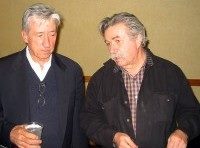
Tom Hayden with Carl Davidson
We both knew the fight was far from over. We now simply had tough problems on another level. Tom focused on writing about the danger of sectarian warfare breaking out between Sunni and Shia in Iraq and elsewhere. I focused on building PDA and the Congressional Progressive Caucus as groups that would give us some clout at the base and in Congress. `You're always the organizer, Carl,' he noted once. It was only partly true. I knew the importance of organization, but I did better work as a teacher and propagandist, aspiring to be one of Gramsci's `organic intellectuals' and `permanent persuaders.' And Tom helped me to finally get one of my articles placed in The Huffington Post.
Some people in my corner of the left had a lot of criticisms of Tom, most superficial, like marrying Fonda, others more serious, related to his electoral work. But I had a different take, and I once told Tom it was the reason why we got along. I surmised that he was never really a Marxist, and hence it made no sense to me to find fault with him over not upholding this or that Marxist view. Instead, I thought he was simply a consistent radical democrat, a left populist fully in the American grain, and he was quite good at it. Tom laughed and agreed, adding that I was one of the hard Marxists he got along with, because I saw an open future, not dogma, and was willing to get outside the box, like with our 1967 `theory of the new working class.'
Tom and I talked about other things we shared, like both being raised Catholic. He told me he never learned until later in life why his middle name was Emmet, after the Irish patriot. Due to the suffocating nature of the 1950s, his parents had never told him why they picked this name, due to fear. I told him my Catholicism was from the family's German side, and my Irish ancestors were largely Orangemen from Ulster. We both agreed that if we had the Berrigan brothers as our parish priests, we might still be deeply tied to the Church.
With that in mind, some on the left were scornful of Tom's visit to the casket of Robert Kennedy, where he let the tears flow. For me, I understood exactly where it was coming from, and it was a tribute to Tom's humanity. He inspired a militant minority, but he was also never afraid of uniting a progressive majority, and even holding out hope for common decency for a few at the top. If those hopes failed to come through, or were answered only in small part, it was not due to the radical authenticity of the man who held them. He will be missed, and not just for a short time. He made many waves that will rise and fall for some time to come.
Carl Davidson
====
Tom Hayden: Presente!
Ricardo Alarcón de Quesada
Tuesday, October 25, 2016
Where do you start? What to say to the hard news of his death?
We worked together at a distance, on the new edition of "Listen Yankee! Why Cuba Matters" partly a result of long conversations between two old friends and is also partly a sort of memories for four hands.
Because our friendship endured intact since the Sixties when we played two glorious run organizations, Students for a Democratic Society (SDS) and the University Student Federation (FEU).
We were united in struggle and ideals and especially in the stubborn conviction that a better world was possible and worthwhile to devote one's life to conquering.
Much would have to be said about Tom Hayden. His long career that so often sent him to prison since the early days when he marched in the South to defend the rights of blacks, to standing at the head of the movement against the Vietnam War that culminated in the youth insurgency in Chicago in 1968. a road that went on afterwards and took him to holding elective office through the Democratic Party without abandoning his dreams of youth.
Because for him the Sixties had not been left behind and without him one was never able to talk about those unforgettable years.
His published works were postponed and delayed, his published work, his numerous books, essays and speeches from the Port Huron Statement, founding manifesto of the SDS and his writings on the African American rebellion in New Jersey, even the most recent, in which he never omitted his solidarity with Cuba and our Five anti-terrorists for whose cause he was tireless combatant.
His life and thought remain an inspiration for the new generations. Because he was, is and will be, what would the founder of the FEU, a young eternal rebel. Hasta la victoria siempre Tom, soul mate, compañero .
TRANSLATION by CubaNews
====
More from those that knew and worked with Tom in the 60s:
- Remembering Tom Hayden (1939-2016): My Friend and a Lifelong Change Maker - Richard Flacks in In These Times
- 'May the circle be unbroken': remembering antiwar activist Tom Hayden - Mike Davis in openDemocracy
- Tom Hayden (1939-2016) - Todd Gitlin in Dissent
"Search the Internet for news stories about public libraries in America and chances are that, sooner or later, the phrase 'on the front lines' will come up. The war that is being referred to, and that libraries have been quietly waging since the September 11 attacks, is in defense of free speech and privacy-two concepts so fundamental to our democracy, our society, and our Constitution that one can't help noting how rarely their importance has been mentioned during the current election cycle."
The article explains what happened, "During the question-and-answer session after Ross's address, a local writer and activist named Jeremy Rothe-Kushel asked about US support for what he called Israel's 'state-sponsored terrorism.' Ross answered, and when Rothe-Kushel followed up with a more aggressive question, Hawkins and one of the other guards approached him and immediately tried to eject him from the building-despite the fact that Rothe-Kushel posed no danger to the speaker or audience members. One of the guards, Brent Parsons, shouted-incorrectly-that Rothe-Kushel was at a private event. Later Parsons added, 'This is private property.' It is revealing that a policeman should have imagined, even in a heated moment, that a public library was private property."
Please share, and encourage your friends to as well, because Further down in the article it says, "For a while, library officials hoped that an accord might be reached between the library and the prosecutor's office; if the defendants agree to refrain from filing a civil suit, the charges against them will most likely be dropped. But the prosecutor's office has announced that it (in co-operation with Hawkins's employer, the Jewish Community Foundation) will go forward with the cases against the both the librarian and the patron."
Susan Harrison
Posted on Portside's Facebook page
====
The muzzling of librarians and intimidation of book borrowers began under the Clinton Administration with legislation called the Counter-Terrorism and Effective Death Penalty Act (aimed at Mumia). The library provision was struck down by the Supreme Court.
Joseph Kaye
====
This article describes how in 2016 libraries are under attack. Unbelievable.
Carole Kennerly
Posted on Portside's Facebook page
====
This article about librarians is an important read....
Ellen Broms
Posted on Portside's Facebook page
In other words, here's where Hillary will involve us in a possible war with Russia, even while she admits the cost will be civilian lives. The trouble is that Trump is crazy, but Hillary is sane! Abandon all hope ye who enter the polls.
Scott Kimmich
====
It is a very bad idea because it could bring US and Russian forces into direct conflict. That's why it's a bad idea.
Carl Foster
Posted on Portside's Facebook page
====
I am sickened by the U.S.' interventionist policies that are causing death and destruction all over the globe.
Jean Cushman
Posted on Portside's Facebook page
====
Establishing a NFZ in Syria brings with it the danger of U.S. and Russian planes in direct combat. That's an insane game of chicken between the two nuclear superpowers.
Diane Laison
Posted on Portside's Facebook page
After the sinking of Drump--"The most daunting task will be rebuilding the peace movement. The question of war was the weakest point in Sanders' politics and the most ominous one in Clinton's. Tensions with Russia are already rising. We've seen the like before - with Vietnam, Central America, Iran, Iraq, and so on. The rhetoric and rationales change, but the toboggan ride to hell is always the same. Clinton is already moving policy to the right in this area. It will be harder to get broad unity for peace, but we have to figure it out and do it." Read this for reasonable approach to post Nov. 8!!!
Chuck Weed
Posted on Portside's Facebook page
====
several of my friends have shared this. HIs words then are more true today. I am hoping the millennials who voted for Bernie, hate Trump , and are not standing with Clinton can use these words to make their own history. I love that Black Lives Matter and it's supporters seem not to have the vanguardism mentality evident in the 60's
Earl Marty Price
Posted on Portside's Facebook page
====
Thanks this reminder that those in the past have struggled with the manipulated anger and resentment of whites:
"Slowly but surely the working people of the South, white and black, must come to remember that their emancipation depends upon their mutual cooperation; upon their acquaintanceship with each other; upon their friendship; upon their social intermingling. Unless this happens each is going to be made the football to break the heads and hearts of the other."
I recently listened to an interview of Ruby Sales in which she said something like "it's almost like some whites don't feel other whites are capable of redemption." I know what she means!
Joan Kresich
Posted on Portside's Facebook page
Thank you, Ethan. Good basis for alliances.
Judy Atkins
Posted on Portside's Facebook page
====
Those who are surprised that the Democratic Party ultimately favors capital over a left agenda need to study a lot more. The hacked and released emails shouldn't shock anyway and could have easily been from nearly any political party anywhere in the world whose leadership faced an insurgency. That doesn't mean one should be sectarian about the Democrats; we live in a single member district plurality system, and that requires the left to view and often work with or within that party in a complex way.
By the way, if "left" includes liberals, then the term has lost all meaning. Again, just because the left must work with liberals (see the first paragraph), one shouldn't include them as a component of the left.
Michael Arney
====
Oh Pooh!
That's just what many of us said about how we would work to get Obama elected and then "become his fiercest critics." Then we all went home, afraid to give aid and comfort to his opponents and let him fight his wars and bail out Wall street and reject single payer.
It was observed recently that Obama's fundamental political mistake was to sneer at his movement as the "professional left" and bet he could work with his real "fiercest critics"--congressional Repubs and their Tea Party.
Today most Sandersistas are backing the same downticket establishment Dems that Obama is campaigning for and explaining why their leader is campaigning for the Lesser Evil.
Mike Munk
====
Leftists need to read this.
Igor Goldkind
Posted on Portside's Facebook page
====
She's not going to like it! ;-) Welcome to Democracy!
Dave Brown
Posted on Portside's Facebook page
====
Ethan Young, a prominent left-wing intellectual, calls on leftists to vote for Secretary Hillary Clinton. He is right.
Ray Markey
Posted on Portside's Facebook page
October 20, 2016
Meanwhile, Donald Trump has been working overtime, as in the debate on Wednesday night, Oct. 19th, with his desperate, off-the-wall smearing of Bill and Hillary Clinton. If you listen to his damning claims, you would think the Clintons were Devils incarnate. Nothing, however, could be further from the truth.
Bill Clinton, a Democrat, was our President for two terms from 1993 to 2001. Hillary Clinton served as our Secretary of State, under Democratic President Barack Obama, from 2009 to 2013. Before that, she also served for two distinguished terms as a U.S. Senator (Democrat) from New York State from 2001 to 2009.
"The White House"
Most of the hot air coming out of this campaign is exactly that: hot air. After the General Election of November 8th, all those election-related charges/counter-charges will end up where they rightfully belong - in the dust bin of history.
I want to underscore a point about the Clintons and just one aspect of their visionary politics. Bill and Hillary evolved into loyal and persistent friends to the principle of Irish Unity. I'm talking here about the moral and legal issue of a United Ireland and to the end to the blood-stained British colonial state of Northern Ireland.
Before Bill Clinton became president, the closest any Irish-American activists, like myself, could get to the White House, was on the outside of that iron fence that surrounds it, carrying a "Brits Out of Ireland" protest sign! The Republican Presidents before Clinton, such as Ronald Reagan and George H. W. Bush, did absolutely nothing-zippo-on this important human rights/freedom issue.
"Sen. Hillary Clinton (D-NY) at a Hearing on Human Rights"
After Clinton won the presidency, however, the situation changed dramatically. He appointed Jay K. Footlik as a Special Assistant. This young, energetic lawyer from Buffalo Grove, IL, a splendid public servant, got things rolling. He kept the Irish-American activist community in the loop. We started getting invitations closer to the seats of power.
For example, on December 20, 1993, I was a part of a contingent of Irish-American activists, who met in the Executive Office Building, with Ms. Jane Holl, Director of European Affairs (NSA). Along with the appointment of a Peace Envoy to the North of Ireland, one of the issues on the agenda that day was our argument for a visa for Gerry Adams, President of Sinn Fein. That request would soon be granted on January 30, 1994.
"Gerry Adams at the National Press Club"
In approving the visa, the President had the full support of the First Lady. He later added these telling remarks: "Absent that first step, that first risk, we might not have had the momentum to move forward and get to the `Good Friday Agreement.'"
More about that critically important "Good Friday Agreement" in a moment.
Getting back to Mr. Footlik. After the meeting with Ms. Holl, he also arranged sessions - again with a group of Irish-American activists - over the issue of Human Rights in Northern Ireland, with officials of the British Embassy in Washington, D.C.; and later, with the Chief Constable of the Royal Ulster Constabulary in Belfast. I was privileged to be a part of those two discussions.
Around that same time, we also met with the U.S. Consulate General to Northern Ireland, at his residence in Belfast. Some of the leaders of the Unionist political parties in the North, and officials of the British government, were in attendance. We exchanged views with each other about the situation in Northern Ireland.
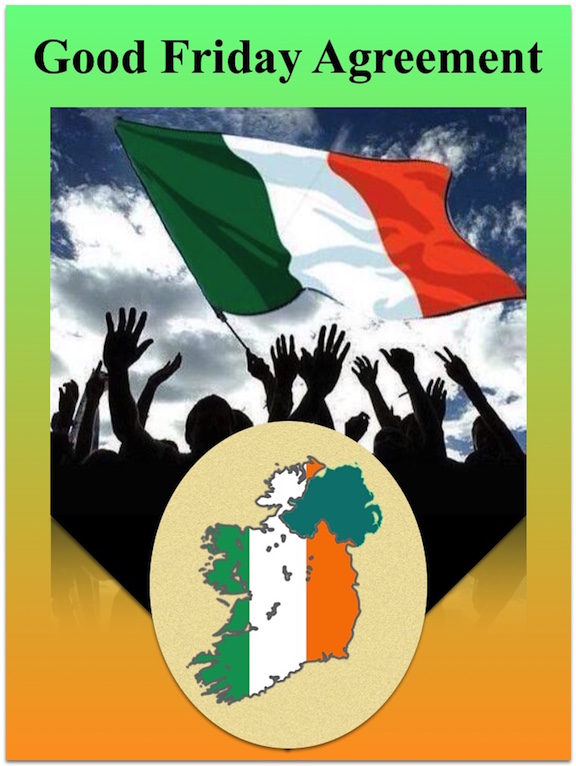
A cease-fire was declared in Northern Ireland, in 1994. President Clinton and the First Lady visited the province in 1995. He soon appointed former U.S. Sen. John Mitchell as a U.S. Special Envoy to Northern Ireland. It was Sen. Mitchell who helped steer the parties to formalize the "Good Friday Agreement," completed in 1998.
The Good Friday Agreement calls for a non-violent settlement of disputed matters in Northern Ireland, between all the parties. It also set out a process that could eventually lead to a United Ireland.
All during the above time, many influential members of the U.S. Congress were letting President Clinton know that he was doing the right thing on the Irish issue and that they had his back covered.
After the Clinton presidency, Hillary Clinton continued to pursue the goal of a United Ireland using peaceful means, through her laudable work as a U.S. Senator and as Secretary of State.
When the Good Friday Agreement was approved, in May, 1998, the White House held a celebration party on the White House lawn, where the President spoke, with his First Lady standing beside him. I was one of the invitees. (Thanks again to Jay K. Footlik.) It was, indeed, a wonderful moment to witness.
Summing up, Bill and Hillary Clinton have proven themselves true friends of Irish Unity. More work, however, needs to be done. A roadmap to peace, justice and unity had been set by the Clintons. It's now up to the people of good will, in the North and South of Ireland, and in London, too, to make Irish Unity a reality.
[Editor's Note: Bill Hughes is a Baltimore-based author, actor and photojournalist. He is the author of "Creating a New Ireland: A Tribute to the Irish Lobby."]
Watch here.
Writers from http://wearenotnumbers.org explain the importance of the sea to every Palestinian from Gaza, and why the flotillas are an important source of hope even if they don't make it.
Gail Miller
A powerful argument in support of powerful writer. Read Ngugi and you will probably agree. I suggest starting with PETALS OF BLOOD.
John Woodford
Posted on Portside's Facebook page
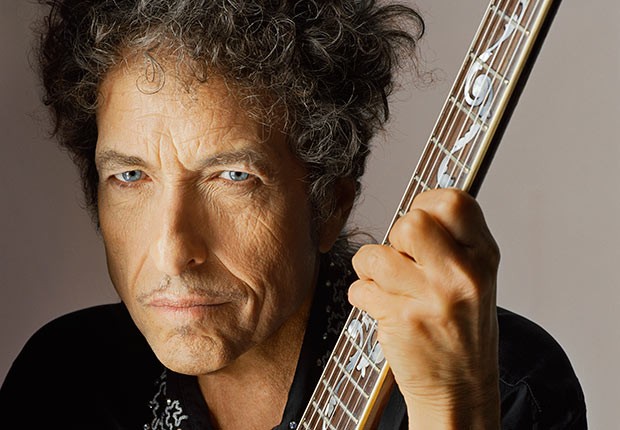
Stefan Schindler's 2006 review of Mike Maqussee's bio of B. Dylan "Chimes of Freedom" revised and reiterated on the advent of Dylan receiving the coveted Nobel Prize for Literature 2016! A great read. Side Note, This piece has a great deal of Massachusetts scholars and local history in it!
Larry Aaronson
Posted on Portside's Facebook page
====
Did anyone read this before reprinting it? What an amazingly flatulent compilation of bullshit! The author seems in love with his own vocabulary, and knows of Bob Dylan's music by reading one book. Whoopydeedoo.
Bob Dylan deserves the Nobel Prize, and he should long ago have been made poet laureate of the US for life. While he has written reams of twaddle, he still has the best grasp of language, life, and American musical tradition of anyone out there. As Arlo Guthrie put it, song writing is about kind of sitting by a stream and throwing in your hook, see what you can catch. I sure would love to be able to fish just upstream from Bobby Dylan..."
Let me be clear. There was no more fervent Bob Dylan fan than I in 1964, complete with harmonica holder. My first performance with a band had me singing his Chimes of Freedom. I learned the finger picking for Girl from the North Country, etc etc. Now I will admit. I had heard him on the radio, and had heard of his songs from Pete and Joan and others, and seen them in Sing Out and Broadside. Yeah. I was a folky. I eagerly bought Freewilling, and slapped it on the turntable. OMG, what have I done? What an AWFUL voice!!! After the third playing I got used to it, kind of like the taste of beer.
The songs were fine, funny, well written, easy to learn and play. Great. Then Times They Are A'Changin. OK. It was perfect. I was graduated from high school, and ready to go to war with the system. Here was the guy to sing for us! I had heard him sing in DC at the March on Washington, he was Pete's guy, wearing the jacket Woody had passed down to him. (By the way, the idiot writer discussing Woody's democratic socialism... Woody was a communist, in all but affiliation, wrote a column for the Daily Worker, etc. Democratic Socialist? Huh? Can't say the "C" word? Which of course suggests he understands nothing of the folk scene Bob got his start in.
Good old Pete, Joan, Judy, Phil, Tom Paxton, but at the head of the parade, our hero, Bob Dylan. Pete's long work, tilling the parched soil and scattering seeds everywhere was finally bringing in a bumper harvest. OK, the Kingston Trio helped get the music into places it might not have penetrated. OK, we had to endure humiliations like The New Christy Minstrels (New Crusty Nostrils), Hootenanny (TV), and saw Peter, Paul and Mary take the first steps on the slippery slope to pop music that Phil Okun had greased for them (their hearts, and content, were still great, but... one worried). It seemed that folk music was going to take the leading place in American pop culture, and save us from Pat Boone, Walt Disney, Arthur Godfrey et al.
And then, hey whoopsie, Paul Butterfield plugged in and what the hell hit us? We used to do documentaries at the place where I worked, and we were planning one on the "folk revival", or as Tom Paxton put it, The Great Folk Scare". So we interviewed a lot of people, including Pete Seeger. Pete told us one of the versions he had of what happened. He insisted he was only concerned that the amps were up too loud and it was preventing the crowd from hearing the lyrics, of which he greatly approved. I like the story better about him advancing on the power feed with an axe. I could relate. In a flash, it was gone.
In a way, Pete had succeeded all too well. Maybe a million kids out there had picked up guitars and banjos, plus some fiddles, mandos, basses etc. But Black influences in rock and roll were coming on strong, and more young musicians were listening to Muddy and the Wolf and less to Big Bill Broonzy, Leadbelly, and Sonny Terry and Brownie McGee. Huh. Electric guitars, huh? WOW, that's LOUD!!! And it pisses the old people off!!! And its a lot more exciting than Childe Ballads, and protest songs.
And there was Bobby, leading the way. The country was gearing up for war, and those of us Bob Dylan fans were gearing up to try to stop the madness. But where was Bob? Getting stoned on acid (a fun and interesting thing to do) and writing "My Back Pages." Oh really? Hey, asshole, people are getting killed in massive numbers, and you want to write Gates of Eden, and Rainy Day Woman # whatever the hell it was? He ran out on us, when we really needed him. And in doing so, he pointed the way for a lot of confused, and stoned kids. Focus on yourself, have a good time, as Phil put it, "Demonstrations are a drag, besides we're much too high, and I'm sure it wouldn't interest, anybody, outside of a small circle of friends..."
Highway 61 is great music. I sing some of the songs to this day. Bob's talent never left him, though of late its getting a bit... thin... but still, one of his recent albums came out and, you know, your foot just starts tapping, the chord change hits and it just feels RIGHT, the verses are lyrical, funny with a gentle humor, and it all fits. He's the champ. He's also a chump. Jan Wenner of Rolling Stone interviewed Bob a few years ago. He asked one question and got a typical Bob Dylan-the-infuriating-asshole type and Jan said, "Bob, do you have to be so difficult?" Dylan looked at him and said, "Jan, have you ever known me not to be difficult?"
But ferchrissake, Portside, please don't burden our email boxes with such pompous crap as this article. There's plenty to say about the Bard of Hibbing (Daryl Henriques "The Schwami from Miami", who grew up in Minnesota and went, with Bob, to the only summer camp for Jewish kids in the area, recalls Bob sitting around the dining hall, playing Elvis tunes to attract the girls), but whoever does so should read Mark Twain's Rules of English Usage (don't use a six bit word when a nickel word will suffice). Philosophy majors should be prevented from writing at all.
Jack Radey
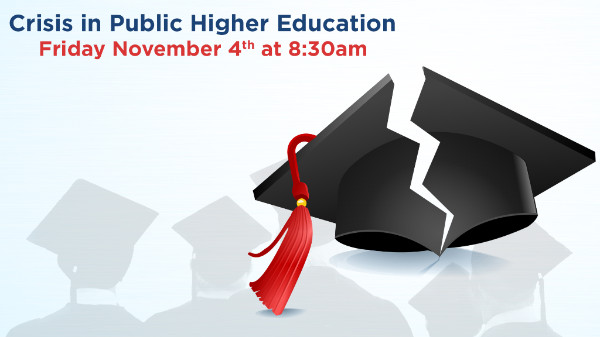
Decades of disinvestment have been dismantling public higher education systems. These institutions have served generations of economically disadvantaged students, often from immigrant and communities of color. How did we get here? What is the path forward?
Speakers:
- Joseph K. Awadjie, B.S., graduate student at Brooklyn College, Chairperson of the CUNY University Student Senate, CUNY Student Trustee, President of the Graduate Student Government at Brooklyn College, as well as Second Vice President of the Brooklyn College Alumni Association.
- Stephen Brier & Michael Fabricant are City University of New York professors and co-authors of, Austerity Blues: Fighting for the Soul of Public Higher Education. Michael Fabricant also serves as the First Vice President of the Professional Staff Congress.
- Nivedita Majumdar, Associate Professor of English at John Jay College and serves as the secretary of the Professional Staff Congress.
- Moderated by Penny Lewis, Academic Director and Associate Professor of Labor Studies at the Murphy Institute and serves as a university-wide officer and in the Graduate Center faculty chapter leadership for the Professional Staff Congress.
The forum is free but RSVP is required.
Murphy Institute
25 W. 43 Street, 18 Floor
New York, NY
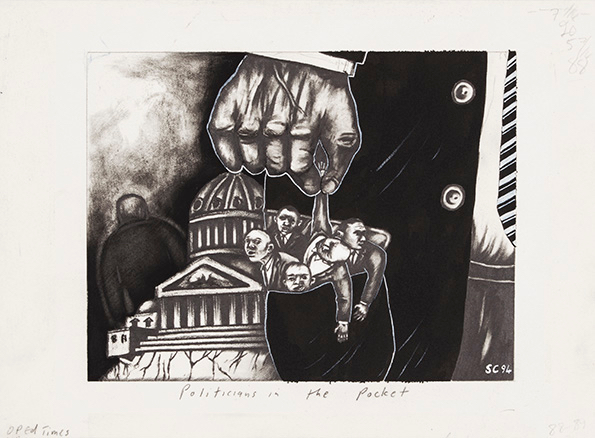
Sue Coe
Politicians in the Pocket 1994. Graphite and gouache on white board. Initialed and dated, lower right, and titled, lower center. 7 1/4" x 9 7/8" (18.4 x 25.1 cm). Illustration for The New York Times.
24 W. 57th Street
New York, NY 10019
On November 3, 2016, at 6:30 PM, Amei Wallach, the journalist, art critic, and filmmaker, will join gallery director Jane Kallir in a discussion about the exhibition to be held at the gallery.
ARTISTS
Baskin, Leonard
Bryson Shahn, Bernarda
Coe, Sue
Daugherty, James H.
Davis, Stuart
Evergood, Philip
Gellert, Hugo
Gropper, William
Grosz, George
Kagy, Sheffield
Kronfeld, Marion Campbell
Levine, Jack
Lozowick, Louis
Neel, Alice
Shahn, Ben
Soyer, Raphael
Sternberg, Harry
Unidentified Artist
Ward, Lynd
In the 1930s, the Great Depression's far-reaching economic impact lent credence to the Marxist belief that capitalism was doomed. Membership in the Communist Party U.S.A. (CPUSA) swelled, and artists became increasingly politicized. The near total collapse of the art market fostered interest in alternative modes of patronage. Recognizing that, even in good times, the elitist art establishment showers its favors on a mere handful of creators, artists cultivated new audiences and a broader relationship with society at large. At the heart of this quest were issues that bedevil artists to this day. Whom does art serve? By whom and by what standards should it be judged? For a brief period, artists tried to conjure an art world beyond the reach of the capitalist marketplace.
From the outset, the Communist Party, both in America and abroad, viewed art as "a weapon in the class struggle," but the specifics of its aesthetic program were subject to vagaries of interpretation and the shifting priorities of the Soviet leadership. In addition to using art for propaganda purposes, Communists hoped to develop a distinctive workers' art, free of "bourgeois decadence" and the conflicts engendered by capitalism. In the U.S., these efforts were initially driven by the Party's culture magazine, New Masses, and its offshoot, the John Reed Club. Founded in 1929 and named after a cofounder of the CPUSA, the John Reed Club aimed to unite "cultural workers" in furtherance of the "international revolutionary labor movement." Responding to "a crisis in art as deep, if not as obvious, as the economic crisis," Club members would wrest control of culture from the elite and reestablish it on a sounder social footing.
Read the rest here.

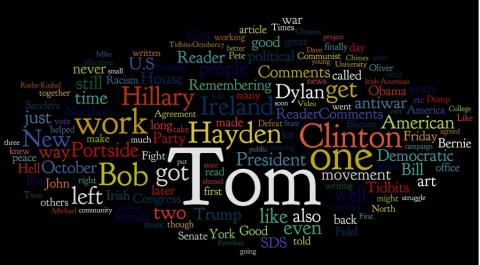
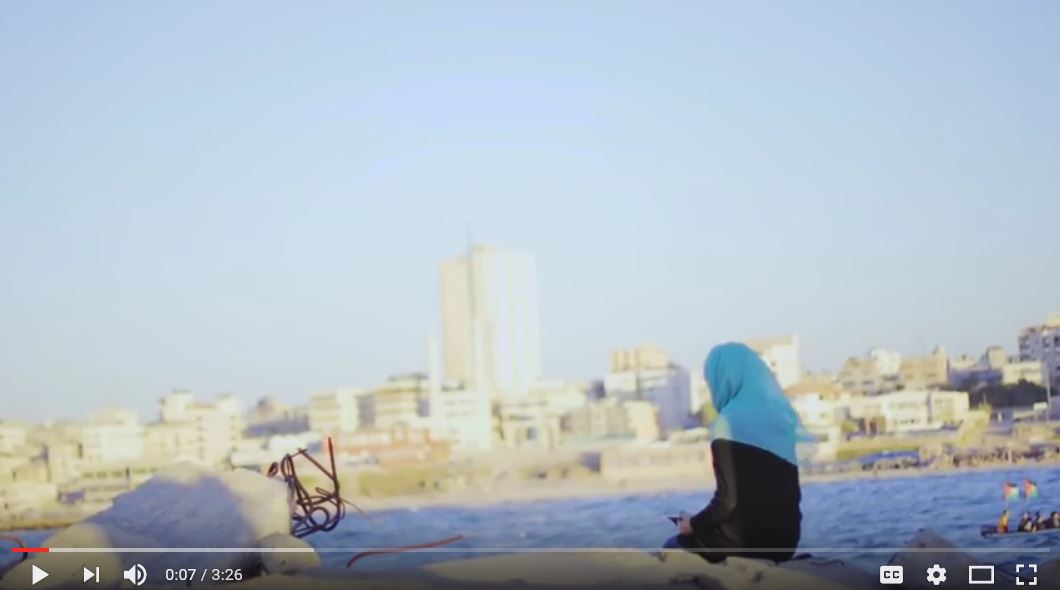
Spread the word